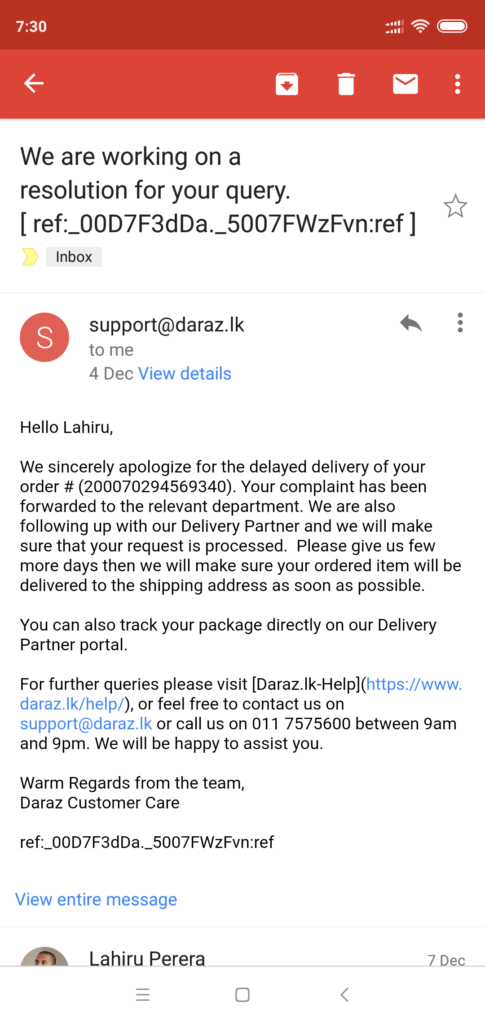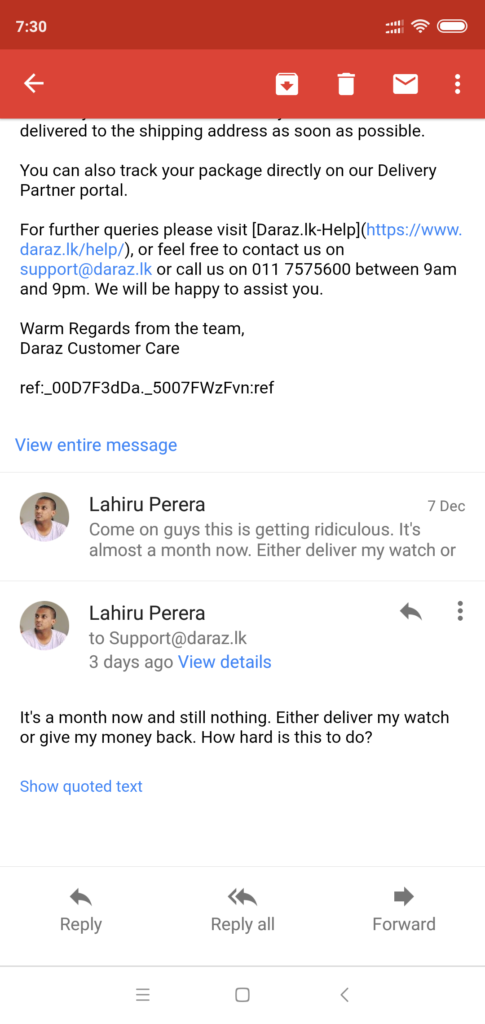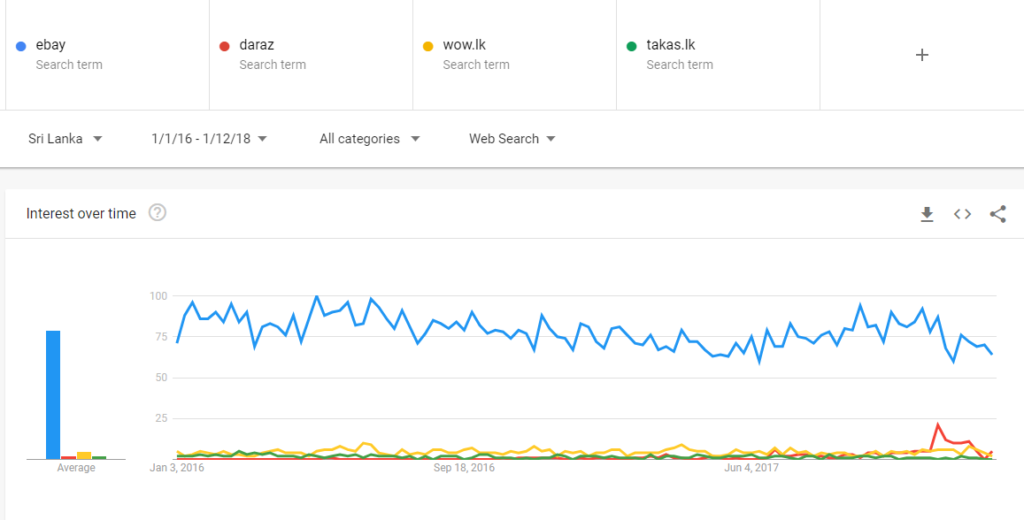I don’t do a lot of online shopping. Other than the occasional accessory, my online shopping usually includes food orders and digital purchases. But If I ever do have the need to buy something, my go-to place would be eBay. Even as local eCommerce stores look to grow their presence in Sri Lanka, there are many of us who would still opt for international options like eBay. Seeing the backlash against Daraz, it’s not hard to see why.
The 11/11 Disaster
Prior to the 11th of November, I’m sure you would have seen the 11/11 sale adverts on social media. Chances are, you might have even been enticed to visit the site for a purchase. I was one of these people. At the time I was looking for a leather strap watch. Instead of going the eBay route, I thought of trying out Daraz. It’s a local site after all. So I should ideally get my purchase relatively quickly. I could not have been so wrong.
I placed my order at 6.24 PM on the 11th of November for a Rs.700 watch. Despite the estimated delivery time within 4 – 7 days, it took them over 31 days until I finally got a call from the courier. Frankly, I’ve had items delivered from halfway across the world sooner than that. But it turns out I’m not the only one with this issue. Quite a few people reported delivery delays by a minimum of 2 weeks.
What went wrong?
This brings me to my next point, communication. There has been a serious lack of communication between Daraz and its customers, particularly with the 11/11 disaster sale. Delivery delay inquiries have been met either silence or the cliche “we’re sorry, we’re looking into this” response. In my case, communication wasn’t a total let down though. Customer service was responsive to my emails, right until one of my emails included the words “money back”. I wonder why.


With regards to the delivery delays themselves, I reached out to Bart van Dijk – Country Manager for Daraz Sri Lanka. According to Bart, “we were overwhelmed by the success of 11/11, the campaign results exceeded our expectations and planned capacity”. Hence the delays. When I first inquired about the delay for my own purchase, the customer service response was pretty much the same.
But deliveries are dispatched from Daraz relatively quickly, at least in my case. My purchase on the 11th was followed by a notification indicating that the package has been sent to the shipping partner, the very next day. Part of the problem here lies with the inefficiency of the courier. At least in my experience. Currently, the company hosts a 50,000 square feet inventory warehouse and a 15,000 square feet sorting center. Additionally, the company also has its own delivery arm called Daraz Express with 150 riders.

Either way, one thing is apparent. Daraz needs to fix its logistics problems. The current capacity is nowhere enough. With regards to expanding efforts, Bart shared that the company is looking to expand Daraz Express by 300% within 12 months. An ambitious goal. One we will see bear fruit, if at all, in 2019.
What about the sellers?
So how have these issues affected the sellers exactly? Well, one could say it’s a mixed reaction for them. On one side, campaigns such as the 11/11 sale proved to be profitable for the sellers. According to Pavithra Perera – CoFounder of Bear Appeal, their own sales orders shot up to as much as 20x during the 11/11 campaign. So for sellers like Bear Appeal, the campaign has proven successful.
On the other side, the delay in deliveries meant that the sellers have uncleared stock. Sellers like Pavithra find it weird that some orders get delivered the very next day while some get delayed for weeks. Even at Bear Appeal, there are orders that came during the 11/11 sale that hasn’t been delivered yet.
But Daraz’s seller issues are older than the 11/11 sale. Early on the platform had issues like delayed pickups from the sellers and lack of communication with regards to promotions. Back then, pickups from the sellers were hardly documented. Pavithra shared that the couriers would just, “take the orders and go”.
But things improved for the sellers, soon after Daraz joined the Alibaba Group’s ecosystem in May. According to Pavithra, their system is better now. Yet, even at this very moment, Daraz is still plagued with these issues and is driving customers away from the platform.
More customer woes
Take Shibly Ibrahim’s case. Shibly’s wife made a few purchases on the 1st of October. At the time, Daraz’s tracking system indicated the order to be in process. A week later, the order was canceled citing unavailable stock. Shibly’s wife never requested a cancelation.
Then there’s Tai Hsin Shiek’s experience. Tai had made a purchase for an item. A few weeks later, he received an email stating that the purchase has been refunded. Tai never asked for a refund.
There are customers like Shibly and Tai who reported instances of orders getting canceled midway through the delivery process and refunded, without any prior notice. Then there are instances of faulty/wrong products being delivered to customers.
According to Bart, Daraz has a system set up that allows the team to monitor customer complaints on sellers. Following too many complaints, the seller’s sales are restricted. If no improvement is made, the seller is taken offline. But how much is “too many complaints” exactly? “We look at the percentage of complaints against the overall orders on a seller level and have different criteria on which we judge a seller”, says Bart.
In case you’re wondering Daraz does train their sellers. All sellers are required to do the basics course on university.daraz.lk prior to selling products. Part of the training includes workshops in Sinhala, Tamil, and English. These are conducted offline on a weekly basis in Colombo. In fact, Daraz is planning to host a workshop in Kandy for over 50 local sellers.
Logistics is everybody’s nightmare
To be fair, it’s not just Daraz. Other players in the local eCommerce market suffer from poor logistics as well. Shageevan Sachinathan, CIO of MyDeal.lk, believes that eCommerce logistics is a game that’s played by the supplier. He further stated that this basically comes down to 3 questions,
– How fast can the supplier send the product to the platform?
– Is the platform efficient enough to prepare and hand over the goods to the delivery partner?
– How much manpower and transportation facilities are available at the delivery partner to do the delivery on time?
Any delay of the above “will trigger a chain reaction which will increase the delivery time” as Shageevan puts it. He also mentioned that sometimes small vendors can be far more efficient than their larger counterparts. Why? Because the larger players often deal with a lot of red tape.
Lahiru Pathmalal – CEO of Takas.lk sees the logistics issue as a lack of technology for information flow. Essentially, information has to flow from supplier to delivery partner, and delivery partner to end-customer. Lahiru has a point. Better information flow among these entities would allow a much more smooth process.
There’s much left to be desired from the industry
Today, social media is more than just a powerful tool. When customers’ issues are left unaddressed, social media become effective platforms to voice their frustrations. This is when all the problems start snowballing. Before you know it, you’re already losing customers before they even become your customers.

Additionally, customer service is often an underestimated aspect. Imagine customer service reaching out to you about a delivery delay before you even think of making an inquiry. Would you be happy about it? Definitely not. But at least you would be appreciative of the effort. Proactive communication can go a long way.







GIPHY App Key not set. Please check settings